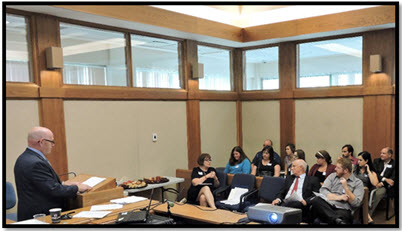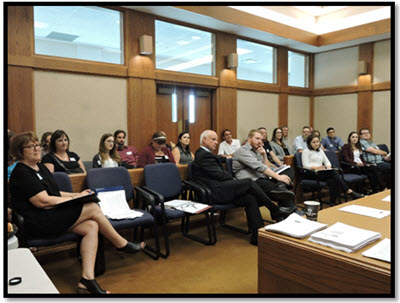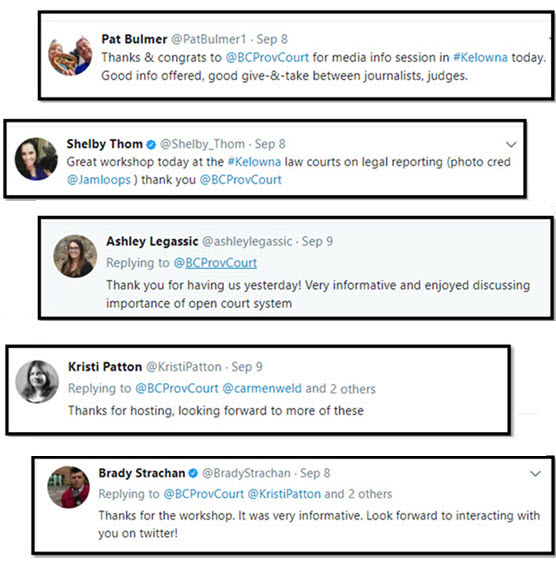BC Provincial Court judges met with 22 journalists from the Thompson-Okanagan region on September 8, 2017 for a workshop covering various aspects of the media’s work in Provincial Court. When the session ended the verdict was unanimous - both journalists and judges reported they benefitted from the exchange of information and frank discussion.
What were the subjects of that frank discussion?
Chief Judge Thomas Crabtree welcomed journalists from radio, television, digital and print media in Kelowna, Penticton, Vernon, and Kamloops to the half day workshop, held in the Kelowna Courthouse. Judge Richard Hewson organized the session and spoke about the importance of open courts, the Rule of Law, and some key legal concepts in the criminal process.

Judge Hewson also discussed publication bans, explaining that in many cases judges have no choice about issuing a publication ban, either because laws passed by Canada’s Parliament impose the bans automatically, or because the Criminal Code requires judges to impose some bans if a party requests them. It’s not that judges want to keep proceedings secret – but they must follow the laws intended to balance the public’s right to know with witnesses’ rights to privacy and accused persons’ rights to a fair trial.
Regional Administrative Judge Ellen Burdett, a former Associate Chief Judge, responded to a range of questions about judges’ work and the courts in the Interior Region. Retired judge Ann Rounthwaite, the Court’s Digital Communications Co-ordinator, highlighted the information available on the Court’s website, its Twitter account, and its regularly posted eNews articles.
The journalists guided the discussion with their questions. Their experience in court reporting ranged from relative newcomer to very seasoned. However, they all agreed how helpful it is when a judge uses the Court’s High Profile Case Protocol to have written reasons posted on the Court’s website within minutes of their delivery in court. They also expressed their appreciation when a judge provides the media with copies of their written judgments when they provide them to the parties and lawyers in the courtroom. They explained how much having access to written reasons helps them report judgments accurately.

Among other topics they raised were the procedure to follow when opposing issuance of a discretionary publication ban or asking to unseal a search warrant. They also asked questions and expressed frustration about public access to court records and to information about search warrants.
At the end of the session, the journalists provided helpful feedback on ways to improve the content, organization and structure of the workshop if the Court were to offer it elsewhere.
Their general comments were invariably positive and appreciative of the Court’s openness, for example:
Very knowledgeable presenters, extremely open to challenging questions.
The willingness to address media concerns is much appreciated, as was the ability to explain concepts simply.
Most appreciate the open and frank discussion and level of understanding.
Thanks so much! Let’s do it again!
Chief Judge Crabtree said, “The session provided a good opportunity to offer information to journalists, but it was also important to hear their concerns and how we can assist in facilitating more access to the information they need for their important work. We will follow up with those concerns and use their feedback as we consider offering similar workshops in other regions of the province.”
In Canada, judges don’t discuss their judgments outside the courtroom – their reasons must speak for themselves. They either speak their reasons or file and read out written reasons in the courtroom. Journalists then report on the judge’s decision and on reactions to it. So, judges are used to journalists having the last word. It was no different here, as journalists who discovered the Court’s Twitter account at the workshop tweeted:

For more information see:
Provincial Court website Media page
Provincial Court Media Guide
Access to Court Proceedings Policy (includes conduct in the courtroom, use of cameras and computers, televising court proceedings, obtaining reasons for judgment, interviews)
Access to Court Records Policy (detailed explanation of who has access to which types of court records, including exhibits and Digital Audio Recordings of proceedings (DARS))
Bans on Publication (provides overview and lists many automatic and discretionary bans)
Use of Electronic Devices in Courtrooms Policy (covers all devices capable of transmitting and/or recording data or audio)

